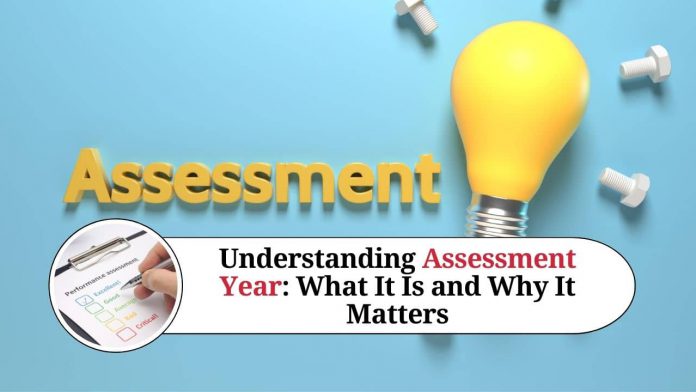Assessment year is an important concept in taxation that every taxpayer must understand. It refers to the year immediately following the financial year in which an individual or entity has earned taxable income. In this article, we will discuss what assessment year is, how it is calculated, and why it matters to taxpayers.
What is Assessment Year?
Assessment year (AY) is a term used in Indian taxation that refers to the year in which the income earned during the previous financial year (FY) is assessed and taxed. The financial year, also known as the fiscal year, is the period from April 1 to March 31 of the following year. For example, the financial year 2022-23 (FY22-23) starts on April 1, 2022, and ends on March 31, 2023. The assessment year for this financial year would be 2023-24 (AY23-24).
During the assessment year, individuals and entities are required to file their income tax returns for the previous financial year. The income tax department assesses the returns and determines the amount of tax payable by the taxpayer. The assessment year is crucial because it is the year in which taxpayers reconcile their tax liability for the previous financial year and pay any outstanding taxes.
How is Assessment Year Calculated?
The assessment year is always the year following the financial year in which income was earned. For example, if an individual earns income in the financial year 2022-23, the assessment year would be 2023-24. The table below illustrates the relationship between the financial year and the assessment year:
| Financial Year | Assessment Year |
|---|---|
| 2020-21 | 2021-22 |
| 2021-22 | 2022-23 |
| 2022-23 | 2023-24 |
It is important to note that the income earned in the financial year is taxed in the assessment year. For example, the income earned during the financial year 2022-23 would be taxed in the assessment year 2023-24.
Why do Assessment Years Matters?
The assessment year refers to the year in which an individual’s or business’s income is assessed for tax purposes. It is an important consideration because it determines the tax liability for a particular financial year.
Here are a few reasons why the assessment year matters:
- Tax liability: The assessment year determines the amount of tax that an individual or business is liable to pay on their income for the previous financial year. Therefore, the assessment year is crucial in calculating tax payments.
- Filing of tax returns: The assessment year is also important for the filing of tax returns. Taxpayers are required to file their tax returns for a particular financial year in the subsequent assessment year. Therefore, the correct assessment year must be used when filing the tax return.
- Deadline for tax-related tasks: The assessment year also determines the deadlines for various tax-related tasks, such as filing tax returns, paying taxes, and claiming deductions. Missing these deadlines can result in penalties or additional interest payments.
- Carry forward of losses: In some cases, businesses or individuals may have incurred losses during a financial year. The assessment year determines the period within which these losses can be carried forward and set off against future profits.
Final Conclusion
In summary, the assessment year is an important consideration in tax planning and compliance. It determines a tax liability, deadlines for tax-related tasks, and the period within which losses can be carried forward. It is important to ensure that the correct assessment year is used for all tax-related transactions to avoid any penalties or interest payments.
Other Related Blogs: Section 144B Income Tax Act
Frequently Asked Questions:
Q:1 What is an assessment year?
A: An assessment year is the year immediately following the financial year in which an individual or entity has earned income, and is required to file their tax return for that financial year.
Q:2 What is the financial year?
A: The financial year is 12 months used by businesses and governments for financial reporting and tax purposes. In India, the financial year runs from April 1st to March 31st of the following year.
Q:3 How is the assessment year related to the financial year?
A: The assessment year is the year in which an individual’s or entity’s income is assessed for tax purposes, based on their earnings and investments in the financial year immediately preceding it.
Q:4 What is the deadline for filing tax returns for a given assessment year?
A: The deadline for filing tax returns for a given assessment year is usually July 31st, although it can vary depending on the type of taxpayer and any extensions granted by the government.
Q:5 How does the assessment year affect my tax liability?
A: The assessment year is the year in which your income is assessed for tax purposes, so it plays a key role in determining your tax liability. Any income earned in the previous financial year will be assessed during the assessment year, and you will be required to pay taxes based on your income and investments during that period.
Q:6 What happens if I miss the deadline for filing my tax return for a given assessment year?
A: If you miss the deadline for filing your tax return for a given assessment year, you may be subject to penalties and interest on any outstanding tax payments. It is important to file your tax returns on time to avoid these penalties and ensure that you comply with tax laws.
Q:7 How can I ensure that I am prepared for the assessment year?
A: To ensure that you are prepared for the assessment year, you should keep accurate records of your income and investments throughout the financial year, and consult with a tax professional or financial advisor if you have any questions about your tax liability. You should also make sure to file your tax returns on time to avoid penalties and interest charges.




















